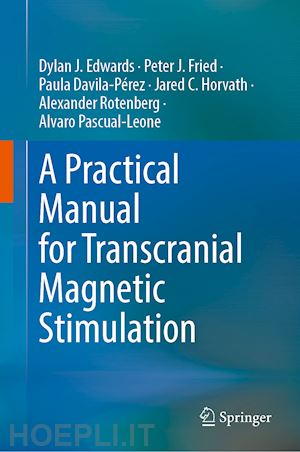
Questo prodotto usufruisce delle SPEDIZIONI GRATIS
selezionando l'opzione Corriere Veloce in fase di ordine.
Pagabile anche con Carta della cultura giovani e del merito, 18App Bonus Cultura e Carta del Docente
This practical guide to transcranial magnetic stimulation (TMS) offers step-by-step instruction for the most commonly used TMS protocols in humans.
TMS equipment is increasingly available in University and Hospital settings and even small clinics. TMS protocols are often taken from disparate publications, and there has not been a single comprehensive and practical reference for the most common procedures. The current book contains structured steps for the various TMS protocols in addition to relevant fundamental information, including a practical summary of principles of TMS and a glossary of terms.
This book is designed to be a quick reference on the office or clinic desk, or in the laboratory, and would be as useful for guiding research and clinical laboratory activities as it would for deciphering TMS study methodologies in the literature.
Front matter. Preface.- List of contributors.- List of Abbreviations.- Chapter 1. Basic Mechanisms.- Chapter 2. Safety.- Chapter 3. Setup and Basic Procedures.- Chapter 4. Baisc Neurophysiology Measures.- Chapter 5. Advanced Neurophysiology Measures .- Chapter 6. Neuromodulation.- Glossary.
Dr. Dylan J. Edwards is the Nancy Wachtel Shrier Director of Moss Rehabilitation Research Institute in Philadelphia, USA, and Professor in the Sidney Kimmel Medical College at Thomas Jefferson University. He has been conducting research in human neurophysiology and noninvasive neurostimulation since 1994. His research focuses on translating basic science findings in neurologically healthy people to develop and evaluate novel, clinically-relevant approaches for neurological assessment and neurorehabilitation in stroke and spinal cord injury. Dr. Edwards has published numerous peer-reviewed papers and given many invited lectures across the globe on noninvasive brain stimulation and transcranial magnetic stimulation (TMS). In addition, he taught and co-led a Continuing Medical Education course on transcranial magnetic stimulation at Harvard Medical School (Berenson-Allen Center for Non-Invasive Brain Stimulation) for 10 years, and co-developed the published technical training standards for noninvasive brain stimulation for the International Federation for Clinical Neurophysiology. Dr. Edwards is currently leading translational research studies to advance precision targeting using contemporary TMS brain mapping methods and to test novel TMS treatment approaches in neurorecovery.
Dr. Peter J. Fried is Associate Director for Research of the Berenson-Allen Center for Noninvasive Brain Stimulation at Beth Israel Deaconess Medical Center in Boston, USA, and Assistant Professor of Neurology at Harvard Medical School. Dr. Fried received his Ph.D. in Anatomy and Neurobiology from the Boston University School of Medicine, and he has been conducting research in human neurophysiology and noninvasive neurostimulation since 2009. His research focuses on using neuroimaging and noninvasive brain stimulation to investigate the neurocognitive changes in healthy and disordered aging. Dr. Fried has published over 40 peer-reviewed papers. In addition, he taught a Continuing Medical Education course on transcranial magnetic stimulation at Harvard Medical School (Berenson-Allen Center for Non-Invasive Brain Stimulation) for 10 years and co-developed the published technical training standards for noninvasive brain stimulation for the International Federation for Clinical Neurophysiology.
Jared Cooney Horvath (PhD, MEd) is an educational neuroscientist with expertise in human learning, memory, and attention. He has conducted research and lectured at Harvard University, The University of Melbourne, Monash University, and over 750 schools internationally. Jared has published 6 books, over 50 research articles, and his work has been featured in numerous popular publications, including The New Yorker, The Atlantic, The Economist, and ABC’s Catalyst. He currently serves as Director of LME Global: a team dedicated to bringing the latest brain and behavioural research to teachers, students, and parents alike.
Dr. Alexander Rotenberg is Professor of Neurology at Harvard Medical School, Director of the Neuromodulation Program at Boston Children's Hospital, and Director of the Experimental Neurophysiology Core at the Kirby Center for Neurobiology. In his research, Dr. Rotenberg is developing methods to treat brain injury that can lead to epilepsy, by identifying and manipulating biological targets using noninvasive stimulation and novel drugs. He leads a basic science laboratory researching applications of noninvasive brain stimulation for models of epilepsy and traumatic brain injury. In addition, Dr. Rotenberg is conducting pre-clinical studies and clinical trials to better understand the neurobiology of brain stimulation and test potential clinical therapies. He is also leading efforts to adapt methods for noninvasive brain stimulation, including transcranial magnetic stimulation (TMS) to pediatric populations with epilepsy and other neurological conditions. Dr. Rotenberg is Co-Director of the Continuing Medical Education training course on TMS at the Berenson-Allen Center for Noninvasive Brain Stimulation, and he has made substantial contributions to the field, both in animal models of neurological conditions and clinical populations.
Dr. Alvaro Pascual-Leone is Medical Director of the Deanna and Sidney Wolk Center for Memory Health and a Senior Scientist at the Hinda and Arthur Marcus Institute for Aging Research at Hebrew SeniorLife. He is also a Professor of Neurology at Harvard Medical School. His research focuses on cortical plasticity, neuromodulation, diagnostic and therapeutic applications of noninvasive brain stimulation for neuropsychiatric conditions, and maintenance of brain health across the lifespan. Dr. Pascual-Leone has been a pioneer in the field of transcranial magnetic stimulation (TMS) since its inception. As one of the world’s leading experts in the field, he has p











Il sito utilizza cookie ed altri strumenti di tracciamento che raccolgono informazioni dal dispositivo dell’utente. Oltre ai cookie tecnici ed analitici aggregati, strettamente necessari per il funzionamento di questo sito web, previo consenso dell’utente possono essere installati cookie di profilazione e marketing e cookie dei social media. Cliccando su “Accetto tutti i cookie” saranno attivate tutte le categorie di cookie. Per accettare solo deterninate categorie di cookie, cliccare invece su “Impostazioni cookie”. Chiudendo il banner o continuando a navigare saranno installati solo cookie tecnici. Per maggiori dettagli, consultare la Cookie Policy.